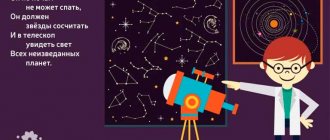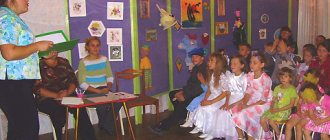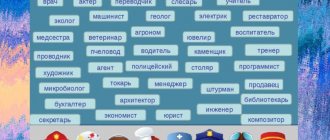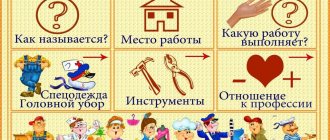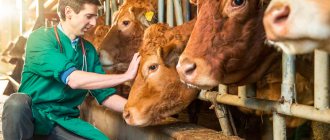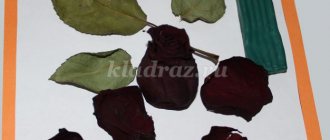Potapova Tatyana Vasilievna CONVERSATIONS ABOUT PROFESSIONS WITH CHILDREN AGED 4-7 YEARS OLD
P64
Potapova T.E.
P64 Conversations about professions with children 4-7 years old. —
M.: TC Sfera, 2008. - 64 p. (Series “Together with children”),
ISBN 978-5-89144-833-9
A methodological manual for preschool teachers contains materials for conversations with children about various professional holidays. The book can be used by teachers, tutors and parents when working individually and collectively with children.
BBK 74.102
Potapova Tatyana Vasilievna CONVERSATIONS ABOUT PROFESSIONS WITH CHILDREN AGED 4-7 YEARS OLD
Editor V.V. Dremova
Cover artist E.V. Kustaroea
Proofreaders JJ.H. Vasilyeva, E.S. Korchagina
Computer layout T.N. Polozovaya
Transparencies of the text were made in the Sfera shopping center. Hygienic certificate No. 77.90.60.053.D.013738.11.07 dated November 23, 2007.
Publishing house "TC Sfera", Moscow, Selskokhozyaystvennaya st., 18, bldg. 3. Tel., 656-72-05 OJSC “Vladimir Book Printing House” 600000, Vladimir, Oktyabrsky Prospekt, 7 The printing quality corresponds to the quality of the presented transparencies
ISBN 978-5-89144-833-9 © .TC Sfera LLC, 2003
From the author.
“On the golden porch sat the king, the prince, the king, the prince, the shoemaker, the tailor - who will you be?”
We are familiar with this children's rhyme. The counting rhyme has a simple continuation: choose any title and continue the game. Life, baby, is not that simple. Well, think for a minute, who will you really be when you grow up? A king? King? - I would probably like to, but - alas!.. What if I became a shoemaker
become?
Or a tailor?
A shoemaker knows how to make new shoes and repair old ones. It’s good that your feet don’t get tired while walking, don’t get wet in the rain, don’t freeze in the cold, don’t sweat in the heat. I also want the shoes to be beautiful. “All this requires great skill from a shoemaker!”
These days, good shoes are made in huge factories with many large and complex machines. The modern shoemaker is no longer just a worker, he is also an engineer.
Although even now among shoemakers you can find someone who is called a JACK OF ALL TRADES.
Shoemaking is a very useful activity. Can you go far barefoot? It's clear that it's not far! And without clothes? - So, maybe a tailor
become?
A tailor knows how to choose the right fabric and style, and knows how to sew clothes in such a way that, as people say, a mosquito won’t hurt your nose. How many different materials are there in the world for sewing clothes? You know? Well, try it, remember... In very hot countries, even today they make skirts from palm leaves. Yes, you yourself probably made hats from burdock leaves on a hot day in the summer in the village or at the dacha! It was so? Of course, these days it’s rare to just wrap yourself in leaves. People have long learned to obtain fiber from the leaves and stems of plants. They even grow special plants for this. Do you know which ones? Right! Cotton and linen. These plants are grown by agricultural workers.
These fibers are woven into threads.
Weavers
make
from threads And these canvases are cut according to style and sewn into clothes by a tailor.
- What a long chain of useful things it turns out to be!
Farmer
will grow flax or cotton and reap the harvest.
A farmer can raise goats or sheep and shear their wool. This wool is used to make yarn for warm clothing. Or maybe a farmer can raise silkworms and collect their cocoons. These fibers will also be used to make wonderful fabrics - silk! The farmer will take all these materials to the spinning and weaving factory, and there it is no longer his concern how to make fabric from them! Here other professions are needed... For example, spinners and weavers.
Spinners and weavers used to spin threads and weave linens by hand. Nowadays you rarely see such a marvel, not like in fairy tales! Nowadays, special machines—spinning and weaving machines—help people spin threads and weave linens. These machines are operated by workers and engineers.
However, they still call themselves with this beautiful old word,
weavers.
Let's go back to the tailor.
A beautiful girl, say, comes to such a master and says: “I want a wedding dress!” - Please! The tailor will choose a light and elegant fabric, choose a style to suit the bride’s face, and sew it together. How will he sew it? - Right! - so that a mosquito won’t hurt your nose! Please! Be happy, dear bride! Peace and love to you!
And, say, the same customer will come in a few years. He will say: “Master-master, please sew me some pants for my son, and stronger ones. He’s so nimble that all the clothes on him burn like on fire!” - Please! And a master can do this. The tailor will choose fabric and stronger threads, make double seams, and make the style more spacious. You will get work clothes that are durable and comfortable. Is it working for the baby?! - Certainly! The baby’s main job is to jump and gallop, so that his arms and legs grow strong and strong, so that any task can be carried out later.
You can’t do any business without a tailor. To the doctor
do you need a robe?
Needed! Does the actress
need a concert dress?
But of course! Does a clown have a funny outfit? Does the military
need a uniform? Mom needs a kitchen apron? Kitchen aprons, however, many mothers sew themselves at home. Many mothers know tailoring very well! Mothers and grandmothers can be such craftswomen that it’s time to show their work at an exhibition!
It's a very exciting thing to make clothes! In almost every home there are threads, needles, and shreds. Some houses even have sewing machines. The houses do not have such large machines as in garment factories, where engineers
they are working... Home sewing machines are usually called not machines, but machines... “Who turned my sewing machine again?!” - Mom or grandmother is angry. Don't be angry, mom! Don't be angry, grandma! It’s better to choose the time and teach your baby to be a tailor. Reveal to him the secrets of mastery, put them into the child’s mind and heart! Then you will leave your child a royal inheritance for life. You yourself know well: nothing makes a person as happy as pride in a job well done.
So, we’ve sorted out the tailoring business... What other professions did we remember?
We have already said that the farmer's
and other
agricultural workers is very
To make clothes, you need to raise cotton and flax, goats and sheep, and silkworms. It is also necessary to collect all these products and give them to other craftsmen who will make yarn and fabrics. But actually, because of this little rhyme with the princes and princes, we didn’t start the whole conversation about professions from the beginning. And from somewhere in the middle...
Professions do not begin with clothes and shoes... You can still live barefoot and naked, although it is not very convenient... And without what can you not show up at all? Right! No food and no drink! Where can I get all this? In the kitchen? In a refrigerator? How does food and drink get into the refrigerator? There is no self-assembled tablecloth, no magic pike, no Little Humpbacked Horse... Without magic, where does food and drink get into the house? - That's right - from the store! And from where to the store?
Food is brought to the store from all over the world... Shrimp - from Antarctica. Pineapples and bananas are from Africa or South America. Where did the bread, eggs and milk come from?
Any food, before it came from the store to the kitchen, was a product. Those who work on the land— agricultural workers—receive food products.
Some products are obtained in the wild by fishermen
hunters, berry and mushroom pickers.
You probably helped your mother or grandmother work in the garden beds in the summer? Or maybe he learned to grow useful plants in kindergarten? There are many big and small tricks in this matter. To grow healthy products, you need to know and be able to do a lot. Much knowledge can be found in books on agriculture. Many skills can be learned at special agricultural institutes. You can graduate from such an institute and receive an agronomist
or
a veterinarian,
become a horse breeder or a greenhouse specialist. But that's not all. The main thing you need to work on the land is to love the land and everything that grows on it!
And of course, it is not difficult to guess that these days in agriculture (as in any other) machines help people. What machines help grow agricultural products? Tractors, seeders, combines and many, many others. Therefore, this matter cannot be done without engineers!
How hard different people have to work so that everyone has a table and a home, books and clothes and many other useful things. People simply obtain some useful things from nature. But people don’t use natural things very often these days. These days they make almost all useful things themselves from various materials. To make a useful thing, you need to select the appropriate material and tool. It also takes skill and time. In general, it's time to talk about professions.
Once upon a time, people lived only in warm countries. They took refuge in caves from bad weather and enemies. These ancient people dressed in palm leaves or animal skins and obtained food in the forest or in the water. They cooked food over a fire. In those ancient times, people did not yet know how to make useful things, tools and machines from natural materials. There were no craftsmen or workshops then. There were no professions in those ancient times.
Nowadays there are a lot of professions. There are so many that it’s impossible to list them all in one children’s book. But we will not do this. We will tell you only about the most important and necessary ones.
TALK ABOUT PROFESSIONS
“On the golden porch sat the tsar, the prince, the king, the prince’s son, the shoemaker, the tailor...”
...In the old days there were few professions, and all of them could easily fit on one porch, along with the king. The first king appeared in Rus' 600 years ago. His name was Ivan III. Letters and books have been preserved from those ancient times. Here are the professions they call: shooter, cook, baker, tailor, armorer, gardener, huntsman, fisherman, pipe maker, sexton, miller, duck maker, falconer, gardener, carpenter, silversmith, stoker, sufferer, merchant, cloth maker.
It’s clear what the shooter, cook, gardener, fisherman, miller, gardener, carpenter, silversmith, merchant, mason did. But what did the pipe maker, the clerk, the duck maker, the falcon maker, the armor maker, the bread maker, the sufferer, the pischalnik and the pearl maker do? ——Probably even mom and dad don’t know about these professions! Professions such as doctor,
pharmacist and
engineer
with assistant. They write that Tsar Ivan the Terrible invited these masters from England.
In the old days, people took pride in craftsmanship. In the old days, people didn’t go to the other end of the city to work, but lived where they worked. The streets were named according to the craftsmen's occupations. In ancient cities there were Oruzheinye, Myasnitsky, Kuznetsky streets. These ancient names are still preserved in Moscow. Sometimes entire cities were named after the profession of their inhabitants. For example, the town of Bronnitsy near Moscow!
Now all professions cannot fit on one porch. There are already many thousands of them. And new ones appear all the time. Many professions are now taught in special institutes. (But first you still need to finish school!) In this book we will talk about the most important and necessary professions. To make it easier to read, those professions that are described in more detail in the book are highlighted in this font.
A profession is something that is done every day and that is useful for other people. The profession requires special training. Each such case has its own rules. For example, a carpenter
must know how to hold a plane and how to remove chips. The violinist has different rules. A violinist needs to be able to hold a bow in his hands, not a plane. Of course, the violin is made of wood, but it is not the shavings that need to be removed from it. The violinist moves the bow along the strings and produces musical sounds.
Every profession has its own tools (like a carpenter
- a plane, and
the musician
has a bow).
Some professions require very complex machines. For a pilot
- an airplane,
for a captain
- a ship,
for a scientist -
a computer.
How to choose a profession? It is very important that you enjoy the work. Only then can you become a master of your craft.
Let's say a person loves nature. Then he will like the work of a geologist, agronomist,
gardener, vegetable grower,
veterinarian,
shepherd,
milkmaid, farmer,
fish farmer,
forester,
game warden or biologist. Almost everyone who later chose such professions loved all living things as children. Were young people. They collected collections. Cultivated plants were grown at home or in the garden and beds. Took care of pets.
Another person is interested in everything related to people. Such a person likes to be a tour guide, teacher,
nanny, coach, teacher, waiter,
salesman,
cashier, investigator, judge,
librarian.
Nowadays, a new profession has appeared - manager.
What about technology? Isn't this interesting? There are so many important and useful things to do for those who love cars and mechanisms! Technology is a very complex and responsible matter. You need to know the technique very well. In skillful hands, any machine or mechanism is a wonderful helper. In the wrong hands, this is a terrible evil. There are many different professions in technology.
It's one thing to process materials. To do this you need to know everything about the properties of this material. You need to know how to use the right tools. Metals are processed by turners,
drillers, milling operators.
Joiners and carpenters
process wood.
Leather is produced by tanners. Spinners make thread from cotton, wool and silk. Weavers
make fabrics from these threads... And all these professions are related to technology!
And how many professions are there where you have to assemble something useful from ready-made parts! This is an activity that many kids enjoy. Very little children collect pyramids from colored rings. Older children play with construction sets. Children love to collect pictures from colored pieces. Adult installers
houses and bridges are assembled from huge parts. They are helped by huge tower cranes and other machines. A watch assembler sits in a comfortable chair and assembles a very precise mechanism from tiny parts - a watch. Assembly mechanics assemble cars, tractors and machine tools.
What about work in transport? There are so many professions here that it’s impossible to count them all. Drivers,
tractor drivers, carriage drivers,
pilots, captains
transport people from place to place by road, by air and by water. And there are also such mobile machines as excavators, bulldozers and combine harvesters! Each such machine must be known well so that it is useful and does not cause harm.
What if one of these machines fails? Who will treat her? Doctor? Vet
? Well, of course not! There are repairmen and adjusters for this.
And isn’t modern electronic technology interesting? Which kid doesn't dream of controlling a computer or even a spaceship? Have you probably already tried turning on the TV or radio? Who repaired this equipment after you? Do not know?
There is also a very complex and interesting technique for scientific work. Microscope, for example. You can even see one molecule in it. Or a telescope. You can see the most distant star through it.
But let’s leave technology aside for now... All children love to dream, listen to fairy tales, and draw everything in the world. There are many adult professions where it is not immediately clear what a person is doing. He sits at his desk. Nearby is a sheet of paper and a pencil. No animals, no plants, no machines, no other people. And the man is busy. He works, as they say, by the sweat of his brow. What is he doing? What kind of profession is this - sitting at a table? Maybe it's a writer
or maybe an accountant or a cryptographer. You can't guess it just by looking at it!
There are a lot of such professions. To make things work, you need a very precise plan. And a very accurate calculation. Nowadays, special machines—computers—help people make plans and carry out calculations. They are further called “artificial brains”. help operate these machines .
There are a lot of professions - thousands! But among them there are several dozen that people especially value and respect. One day a year is considered a holiday for such professions!
Russian Press Day
January is a holiday for writers
and editors, typographic workers and publishers, proofreaders and typesetters. This is the name given to the professions of people who work to publish books, magazines and other printed materials.
There are books in every home. Thanks to books, culture develops and is preserved. Through books, people learn the thoughts and advice of other people, even those who live far, far away or who lived a long time ago. Books are part of world culture, common to all people. It is very important that every person cherishes the achievements of culture, knows how to use them and adds new discoveries to them bit by bit.
At different times and in different countries, the first books were written on wooden and clay tablets, papyrus, birch bark, silk, and leather. Such books were rare. Books appeared in every home only after paper and special printing machines were invented. Printers worked on such machines. The first Russian printer was Ivan Fedorov. A monument was erected to him in Moscow.
Who prints books, newspapers and magazines these days? They are printed by machines in a printing house. Of course, machines don't do this themselves. The machine is operated by typesetters and printers. Writers, journalists, artists decide what and how to print
editors, proofreaders, distributors.
Ready-made books, newspapers and magazines are transported to all corners of the world by cars, trains, planes, and ships. deliver newspapers and magazines to homes .
WRITER
Writers write books. Recently, our country solemnly celebrated two hundred years since the birth of Pushkin. This is our favorite writer. Probably all children know his fairy tales. Some people love the fairy tale about the goldfish. Some people like the fairy tale about Tsar Saltan. There are also good writers these days. Who among you does not know by heart the poems of Korney Chukovsky, Samuil Yakovlevich Marshak, Sergei Mikhalkov, Agnia Barto? Many children know and love stories about Cheburashka and a boy named “Uncle Fedor.” They were composed by the writer Eduard Uspensky. Writers P.P. Bazhov and E.A. Permyaks composed fairy tales and stories for children about wonderful craftsmen. Adults and children love the entertaining books of Grigory Oster and the fascinating stories about the COAP club, written by the writer Milen Konstantinovsky.
It's not just writers who write books. There are also scientific books and all sorts of reference books. They are read more by adults. And children love stories with many miracles! A good writer doesn't just write interesting stories for children. He does this so skillfully that the reader becomes a participant in these stories, he wants to be better, help others and believe in goodness.
A good book is your best friend for life.
(Pictorial series: pen, typewriter, paper, computer, books, writer at the table.)
JOURNALIST
Who is the first to find out all the news and bring it to the editorial office? - Journalist! Journalists travel for news around the world - with geologists
and geographers, athletes and artists, politicians and businessmen.
Journalists rush to where new construction projects are starting, where there is a war or some kind of disaster has occurred. They meet with scientists
and
military personnel, writers and
artists
Everyone is questioned, everything is written down in a notebook or on a tape recorder. Then they tell you the most interesting news on the radio or TV. They write about them in the newspapers.
(Pictorial series: pen, notepad, tape recorder, camera.)
ARTIST
Everyone loves to draw. But becoming a real artist is not at all easy. To do this you need to work long and hard. Train your hand to draw precise lines with a pencil, charcoal, chalk, or brush. Train your eyes to distinguish the most subtle shades of color. Train observation, memory and imagination. Study the work of great artists and the laws of nature... A real artist must not only accurately depict an object or living creature. (There are cameras and video cameras for this.) A real artist creates an interesting story in the language of lines and colors. And this story is as understandable to people in different countries as music or dance.
Previously, paintings by artists were kept only in museums or by individuals. Nowadays, with the help of printing presses, books and calendars, newspapers and magazines are decorated with works of artists.
Thanks to the press workers
the art of artists enters every home.
(Picture series: brushes, paints, easel.)
Guidelines
After each story about the profession, an approximate list of illustrations (pictorial series) is proposed that it is advisable to use during conversations with children.
In order to give the conversation the character of a game, you can invite children to correlate pictures of objects with professions.
It is advisable to precede a lesson in visual arts with children by talking about the profession in the days preceding professional holidays.
Remind the children to congratulate their loved ones, relatives, and friends on the holiday.
We wish you success!
FEBRUARY
Defender of the Fatherland Day
MILITARY
You and I live in a country called Russia. Russia is our Fatherland. There are many different countries on Earth. Not all countries live together. Sometimes there are wars. That's why every country has an army. Soldiers and sailors, officers, generals and admirals serve in the army. All of them are defenders of the Fatherland! In peacetime they study. They conduct training battles in the seas and forests, in the steppes and mountains. They study military equipment. The army has ships and planes, tanks and all-terrain vehicles. The military has different weapons. Pistols, cannons, mortars, rocket launchers. All military equipment must be in perfect order. The army also has modern technology such as computers. Defenders of the Fatherland are also studying military history. Some military professions have their own separate holidays during other months of the year. In May - at the border guards.
In July - for
military sailors.
In August -
for the pilots.
In September -
with tank crews.
In November - among artillerymen, rocket men and marines. That's how many professions there are in the army!
Each of the military professions is honorable and important. Border guards guard the borders of our Motherland on land, military sailors guard the sea borders. Tankers, artillerymen, rocket men - all military personnel are ready at any moment to protect the civilian population, that is, you and me. The military is a heroic, respected and very necessary profession!
(Pictorial series: tanks, all-terrain vehicles, guns, mortars, rifles, machine guns, rocket launchers, ships, planes, computers, people in military uniform.)
International Theater Day
The art of theater was born a very long time ago. But even today people love theater. You've probably been to theaters more than once to watch interesting performances. Do you know how many people worked to prepare one performance? Writers, actors,
directors,
composers,
costume designers,
artists,
lighting designers and stagehands!
ACTOR
The actor works in the theater. Thanks to the skill of the actors, your favorite characters come to life on stage. You watch the play and believe that in front of you are the real Pinocchio and Malvina, Little Red Riding Hood and the Gray Wolf. Costumes help actors transform into different characters. wigs and makeup. To become a good actor, you need special talent and a lot of work. Actors rehearse every day, learn their roles by heart, and train their voices and movements. They must know and see a lot and be very attentive to other actors on stage. This is one of the most ancient and beloved professions. In the old days, traveling actors staged performances right in the open air. They performed at fairs and during holidays and brought great joy to people.
(Image: costumes, wigs, makeup, curtain, theatrical characters.)
TRAINER
There is a special theater in Moscow - the Corner named after. B.J.I. Durova. It was once arranged by the famous trainer Vladimir Durov. In this theater the actors
trained animals work. Four-legged and feathered actors are prepared for work by people of a rare and complex profession - trainers.
Probably everyone has seen brave artists who command ferocious predators. Are trainers really not afraid of lions or tigers at all?
Trainers know the habits of animals well. People of this profession are very patient and observant. They love their students and try to choose roles they like. For example, it is known that the striped raccoon loves to dip all sorts of objects into water. And the raccoon is given the role of a washerwoman in the play! Trainers usually take animals in when they are still babies, take care of them, and educate them. And the animals completely trust these people. For example, they jump on command into a burning hoop, although all animals are afraid of fire, ride a bike, play football, catch balls...
(Image: animals on stage, trainer in a suit.)
Geologist's Day
GEOLOGIST
Geologists travel to different places and study the bowels of the earth. Deep underground they search for coal, oil, gold, diamonds, iron and copper ore, building stone, salt and water. Geologists' work is difficult. They have to live in tents and cook over fires. Nowadays, geologists, of course, are helped by scientific instruments and various machines. But they still have to walk hundreds of kilometers, climb mountain cliffs with heavy backpacks on their backs. The backpacks contain special hammers to break off pieces of strong rock. Sometimes earthly treasures are hidden in deep caves. And geologists go there too! A geologist must be strong and courageous, be able to find his way using a map and compass. And a geologist must also be a true friend. This is such a job!
(Pictorial series: minerals, pickaxe, shovel, backpack, hammer, tent.)
Cosmonautics Day
ASTRONAUT
Everyone knows the name of the first cosmonaut of the Earth, Yuri Gagarin! He was the first person to go into space and orbit the Earth.
Yuri Gagarin was a pilot.
Now people from other professions have been in space.
Doctors, engineers, scientists.
But they are all astronauts! Astronauts have difficult working conditions. During the launch and landing of the ship, they experience large overloads. The body becomes heavy, arms and legs cannot be lifted. But when a spaceship revolves around the Earth, weightlessness sets in. It is not clear where the floor is and where the ceiling is. All objects float like feathers in the air. And astronauts swim too. They have to drink and eat from special tubes so that food and water do not float anywhere.
There are many instruments in a spacecraft, and the astronaut must know all of them. These are instruments for both ship control and scientific research.
And he must also be able to shoot, fish, find food in the desert and in the ice... Why? In case the ship lands far from the cosmodrome.
So, if you dream of flying into space, try not to waste time. Learn all the useful things!
(Pictorial series: instruments, helmet, suit, view of the Earth through the porthole.)
Science Day
Who doesn't dream of finding treasure! For example, a chest of jewelry. Of course, it’s nice to dream about it, but it’s very rare to find other people’s treasures. But almost everyone can become the owner of such a wonderful treasure as the Treasure of Knowledge, however, if they try really hard. After all, this treasure is not given without difficulty.
SCIENTIST
All adults work: some grow plants and animals, some mine coal and oil, some drive cars and treat people from diseases, some keep order on the streets. And there is also a special profession - scientist! This is a person who studies all his life: he collects all the knowledge about what is happening around him and looks for the unknown and incomprehensible. Scientists think about strange things and find out their meaning. And then they write articles and books about it. Together, scientists create science.
Previously, there were very few scientists. There are many of them these days and there will be even more. There are historians. They study how people lived in past times. There are other topics
— they study numbers.
Chemists
study the laws of transformation of one substance into another, and mechanics study the laws of motion of bodies. Environmental scientists study the laws by which many living creatures manage to live together in a variety of places: in water, underground, in the desert, in a city, in a forest or in polar ice.
Finding answers to the mysteries of nature is not easy. But how interesting it is to find such a solution!
(Pictorial series: instruments, books, a scientist giving a lecture, etc.)
Radio day
RADIO WORKER
There is a radio in every home. I turned the handle and wonderful sounds poured out of the small box! Radio was invented a little over a hundred years ago. At school you will learn about electric and magnetic forces and will even be able to make a simple radio receiver yourself. In the meantime, just twist your hands and listen to your favorite songs and fairy tales. It’s good that there are scientists, engineers,
editors,
actors,
directors,
composers, journalists.
It is thanks to them, radio workers, that adults and children can listen to music, poetry, fairy tales, plays and news at home, at school or on the street.
(Pictorial series: radio, radiotelephone, antenna, headphones.)
International Museum Day
MUSEUM WORKER
Do you have any rare items in your home? Ancient coins? Paintings by famous artists? Any weird shells or deer antlers? When there are a lot of such rarities in the house, guests say: “Well, you just have a museum!”
Have you been to a real museum? Even the smallest towns have local history museums. There you can learn a lot of interesting things about your native land. Scientists work in museums
guides, restorers. Scientists are preparing exhibitions of rare things. Museum items are called exhibits. Next to each exhibit there is a short story about it. Guides lead museum visitors through the halls, talk about the exhibits and point them out with a pointer. You are not allowed to touch things in museums with your hands. Museum visitors do not see restorers. They work in quiet workshops and tidy up museum curiosities. Many of them are found in the ground. You have to carefully clean them from dust and dirt with soft brushes.
(Pictorial series: various exhibits, guide, attendant, restorer.)
Border Guard Day
BORDER GUARD
Border guard is a military profession. Every country on Earth has its own border. On the map, the border of the country is drawn in bright colors. In fact, it is marked with boundary pillars. It is only in fairy tales that heroes are transported from country to country on an airplane carpet or the Little Humpbacked Horse and do not ask permission from the border guards. Nowadays, you can only get from one country to another through special border checkpoints. Those who try to secretly cross the country's border are detained by border guards. Then such people are punished very severely. Sometimes border violators can be very cunning and even dangerous. But the border guards still catch them: tracking dogs and military equipment help them in this.
(Pictorial series: border guard in uniform, dog, gun, camouflage robe.)
Chemist's Day
CHEMIST
Chemists, like real wizards, are able to transform one substance into another. But this is not a fairy tale at all. Chemists do everything according to science - without a magic wand or magic spells. Huge chemical factories produce soda and acid, soap and paints, washing powders, fertilizers and chemical fibers. It’s a shame, but the air and water near chemical plants often contain substances that are harmful to nature.
Nature is a forest, field, sea, river, stars, sun, wind, flowers, bees - in a word, everything that is not made by human labor. All this must be protected! Once upon a time, man himself was a part of nature: he ate what he got from nature, he lived in caves. But then people learned to make different tools - objects that did not exist in nature before. With the help of tools, man built many houses, roads, dams, various machines and mechanisms. In our time, these artificial things and objects have become as numerous as all living beings in the world combined.
While man did not make too many artificial substances, there was no excess garbage in nature. In the wild, it is so arranged that everything that was once born soon disintegrates into the smallest particles, from which new living beings can be built. And so on endlessly! Man is another matter: the fruits of his labors, having served their time, turn into dirt and garbage, littering landfills and reservoirs. It seems that it is no longer possible to find a place on Earth without dirt and garbage! If people lived in friendship with nature, knew the laws of nature better and were able to create new things without polluting everything around them with waste, life on Earth would become much happier.
You will read about people who work specifically to preserve the nature of the Earth on the next page.
(Pictorial series: 1. What chemists and chemical instruments produce. 2. Nature with and without smoke and landfill.)
International Family Day
Family - here you go: we have a book about professions, right?! Don’t rush to be surprised, think better. …Think, for example, about why people very often choose the same professions as other family members? Remember, we have mentioned many times in this book how important it is to love your profession. Adults know something else well: if you love something since childhood, it will last your whole life!
In the old days, almost all professions were inherited. The blacksmith father taught his sons blacksmithing, and the gunsmith taught him weapons. The doctor taught his children healing skills, and the stone cutter taught his craft. Parents taught their children skills and at the same time passed on to them a love for their work.
Now there are a lot of professions. Now in almost all families, even close relatives are engaged in different jobs. Imagine that dad is a metallurgist,
Mom is
a doctor,
grandmother is
retired
teacher tanker.
The daughter in this family wants to become
a composer,
and the son wants to become
a veterinarian.
How can they all enjoy their favorite work together?
I’ll tell you one very simple recipe! There is such an important and good job - homework
There is no special holiday for this work; they do not give prizes or medals for it. But if all family members love homework, then such a family lives in cleanliness and comfort. And most importantly, everyone is kind to each other! (It’s worse when members of the same family shirk their homework or do it haphazardly.)
Grandfather, a tank driver, buys groceries for the whole family. The grandmother-teacher cooks for everyone. Mom is a doctor and monitors the cleanliness and health of the household. Dad, a metallurgist, is responsible for ensuring that all household appliances are in good working order and work without interruption. And children help adults and learn to do any work skillfully and from the heart!
This month we celebrate World Environment Day, Light Industry Workers' Day, Medical Worker's Day, Inventor and Innovator Day.
Fisherman's Day.
FISHERMAN
The fish that your mother cooked for you was caught in the river or in the sea by fishermen. You can catch fish in the river with a fishing rod. Many children really like this activity. It is not as easy to catch fish in the sea as in the river. The sea is deep. There are fish there, apparently and invisibly. And they catch it with large nets (they are called trawls). These nets are lowered into the water from a ship called a trawler. Before lowering their nets into the water, fishermen watch for a school of fish. They are helped in this by special devices - echo sounders. You will learn how these devices work when you grow up. In the meantime, know that the fish brought to your table was passed along a chain by the kind hands of workers of different professions. Fishermen - drivers, drivers - sellers.
So eat and don't be capricious.
Doctors
say that fish contains many
Conversation “All professions are important”
Elena Spirina
Conversation “All professions are important”
Conversation “All professions are important”
preparatory group
Goal and objectives: Expand and enrich children’s knowledge and ideas about professions and work. Cultivate a respectful attitude towards people of different professions. consolidate the ability to give reasons for your answers; develop logical thinking.
Preliminary work: solving riddles about professions; reading fiction “Who to be?” I. Karpov (series of books about professions); “What do crafts smell like?” D. Rodari; attention game “Who can name the most professions.”
Progress of the conversation:
Educator: Hello guys! Today we will talk about different professions. What real professionals should know and be able to do.
1. Guys, tell me, where do your parents rush every day? (to work)
2. Why do people go to work? (Earn Money.)
Educator: Let's imagine a time when people lived in the forest, in caves. They did not yet have modern houses, modern clothes.
3. What did they do? (Yes, men went hunting, brought back prey. Women prepared food from what men got, tanned animal skins, and then sewed clothes from them.)
4. What professions of people originated in those very ancient times? (Hunter, cook, tailor.)
Educator: But people learned to make dishes from clay and build more comfortable homes for themselves from wood.
5. What new professions have appeared? (Potters, builders.)
Educator: Let's prepare a workplace for the builder and the cook. There are different objects on the table; you need to select from them only those that the cook and builder will need for their work.
Educator: Man has always wanted to live better. He had to travel long distances, and he came up with transport.
6. What professions have appeared? (Driver, mechanic, designer.)
Educator: People are all different, and everyone tried to choose a profession that he liked.
7. Think. What professions have existed since ancient times? (builder, cook, tailor doctor.)
8. What professions appeared when technology and electricity began to develop? (Driver, pilot, workers who work on machines and make various parts, mechanics, mechanics.)
9. There are professions of people who work outside the city. Without their work, we would have no bread, no milk, no sour cream and many, many other products. (Grain grower, livestock breeder, vegetable grower, shepherd.)
10. What professions have appeared recently in our country? (Computer scientist, programmer, banker, businessman.)
Educator: Well done, guys! We remembered many interesting professions. It is impossible to determine the most important and necessary of them. All of them are necessary and useful. The main thing is that a person of a particular profession loves his job and conscientiously fulfills his duties.
